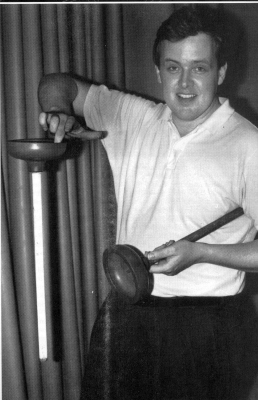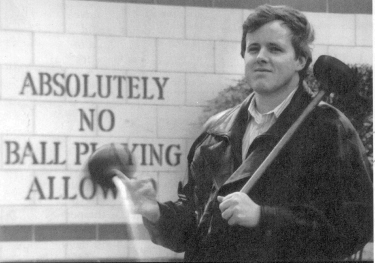
Photo by Dusten Galbraith |

Who needs a ball when you have a plunger? (photo: On the Spot Productions) |
Page 21 Summer, 1994
|
By Dusten Galbraith
A few years ago a new face appeared in the juggling world. Elliot Cutler was, and is, a fairly good juggler. He was, and is a very good magician. But he will always be known, at least among jugglers, as "THE PLUNGER MAN."
A
professorial looking character, glasses
Shortly,
the conventional looking professor pulls out a conventional
looking plunger and proceeds to dazzle the audience (his class)
with an amazing demonstration of plunger flips, slips, tip taps,
stick stops, heel hops, hops and catches. This is
accompanied by a calm and unrelentingly detailed
The
plunger routine has been performed at a number of regional
festivals and at IJA festivals. At the 1992 Montreal IJA festival,
Elliot received the
Elliot's
act is a character piece. For jugglers, it's a case
study in making the most with the least and how to develop a
characte and performance appropriate for one's personality.
JW:
Elliot, can you tell us how EC:
Well, I had been doing the
The
plunger in the restaurant was not appreciated by the management. I
didn't have an "act"
JW: Just a dry bland demonstration? EC:-Thanks,
yes, no character or entertainment value beyond so called
technical "mastery." I had also shown it off at my
first juggling festival, the Illinois Juggler's Spring Fling, a
few years before. I felt terrible at first because all those
people were so good! So I put down my homemade clubs, picked
up my plunger started to plunge while
I thought about packing it up and leaving.
JW:
A lot of us know the feeling! Buy what happened then? EC:
Well, I looked up and there was a small crowd around me.
I said "Hi" and
JW:
How did you begin to develop the professor character? EC:
A few years ago I met a juggler who
Then
I took some improvisation classes. Jugglers, it turns out, are
adept at handling invisible objects. The improv was also great
practice for entertaining. You are faced with the prospect of
"being entertaining" without props to hide behind. You are
forced to develop stage presence apart from your technical
abilities. Through the people I met there, I was asked if I could come up with a
JW:
Strange
in what way? EC: Their act was a rather adult puppet show presented in a sort of punk / performance art bar. I decided I'd write the character for that audience and that location and try to make a real act out of my demonstration.
JW:
So you made a punk plunger
man? . EC:
Brash, loud, rude, like that, but the
JW: And the plunger taking your temperature. EC: Thanks.
EC:
A friend of mine watched
the show
JW:
Where did the professor character really come from? EC:
In school, I majored in mathematics
JW:
How did the act come together once you had the character picked
out? EC:
That was the best thing about it.
JW:
How can a trick be made EC:
You create a theatrical / context (i.e. an excuse) in
JW:
Why so you use such complicated language in your
show? EC:
I decided early on that I don't expect technical talk to be amusing and don't think I can maintain it. |

Photo by Dusten Galbraith |

Who needs a ball when you have a plunger? (photo: On the Spot Productions) |